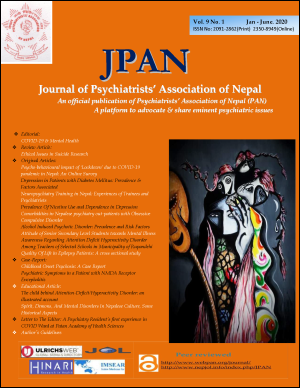Neuropsychiatry Training in Nepal: Experiences of Trainees and Psychiatrists
DOI:
https://doi.org/10.3126/jpan.v9i1.31312Keywords:
Neuropsychiatry, Psychiatry Training, Psychiatric Trainees, NepalAbstract
Introduction: Training, practice and continuing professional development in neuropsychiatry and clinical neuroscience vary across different countries. However, little is known about the opinions of the Nepalese psychiatrists about the provision of neuropsychiatry training. This study evaluates the current training in neuropsychiatry and clinical neurosciences during the postgraduate psychiatry training and reflect on current practice.
Material And Method: The participants were psychiatrists (qualified and psychiatry residents). An online questionnaire using Survey Monkey electronic Platform was emailed with a uniform resource locator (URL).
Results: Sixty-four out of ninety-five participants responded with response rate of 65.3%. Two-third of the respondents were qualified psychiatrists. The duration of neurology rotation ranged from 1 to 3 months and it was reported to be mandatory. Two-thirds reported that there is no clinical neuropsychiatry training during psychiatry residency. On a ten-point Likert scale (with 10 being the highest possible score), the participants rated their neuropsychiatry training as 5.16±1.84 while they rated the necessity for further training in neuropsychiatry as 7.92±1.96. Two-thirds identified a lack of interest by the specialty society as an obstacle for the implementation of neuropsychiatry training for psychiatrists. More than half viewed that neuropsychiatry training to be incorporated into the existing psychiatry training scheme whereas three-fifths favoured a one-year specific training program in neuropsychiatry after completion of psychiatry training.
Conclusion: The current psychiatry training is inadequate to meet substantial neuropsychiatry training opportunities for a high proportion of psychiatrists in Nepal. This finding may be used to improve and standardize neuropsychiatry training in postgraduate psychiatry training.
Downloads
Downloads
Published
How to Cite
Issue
Section
License
This license enables reusers to distribute, remix, adapt, and build upon the material in any medium or format, so long as attribution is given to the creator. The license allows for commercial use.




